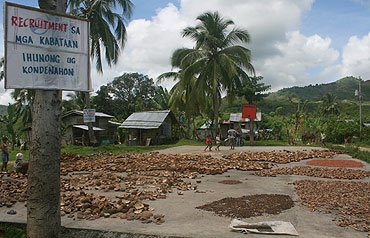Side Bar Story Duterte keeps his hands off Paquibato
The city�s largest district of over 40,000 people, Paquibato has become a virtual garrison these days. People cannot move around the place without identification cards bearing the signature of soldiers.
On the veranda of the village hall of barangay Mabuhay, government soldiers mounted an M60 machine gun, a menacing reminder among its residents of the silent war in their midst. In a place called Crossing Hasil towards the border with Panabo, soldiers at a checkpoint stopped all vehicles for inspection.

(davaotoday.com photo)
Earlier this month, a fuming Mayor Rodrigo Duterte had declared he will keep his hands off Paquibato, raising fear that rights of civilians might be violated in the resulting armed clashes between government and rebel forces in the area.
Paquibato has long been considered battleground between the military and the Communist New People�s Army. Its hinterlands have been a stronghold of NPA leader Leoncio Pitao, the elusive Kumander Parago whose 20 year old daughter, abducted and killed on March 4 in Davao city, was buried last week.
Duterte has kept �good rapport� with the rebels through the years, a policy that relatively kept peace in the area in the past but which apparently clashed with army�s thrust to crush the 40-year old insurgency through military might.
So, as the military increased their presence in Paquibato, city officials were increasingly concerned over the violations of the basic rights of civilians in the area.
Duterte, for instance, had called the attention of the military when he learned about civilians being beaten up in Paquibato for failing to tell soldiers about the rebels� position in the area.
On January 27, the eve of Araw ng Paquibato festivities, soldiers belonging to the 10th Infantry Division allegedly beat up four farmers in barangay Mapula�s sitio 5 because the farmers could not tell them where the rebels were.
Two days later, a landmine exploded in nearby barangay Panialum, killing one soldier and wounding eight others. The soldiers were part of a convoy under the 1003rd brigade of the Philippine Army, headed by Col. Joel Ybanez.
As a result, soldiers beat up three residents the following day. The soldiers were mad that residents failed to inform them about the NPA landmines in the area. Major General Leo Joggy Fojas, former commanding general of the 10th Infantry Division, announced the next day that he will clear Paquibato of Communist rebels by 2009.
Hearing about the human rights violations, the city council ordered a probe in February. Another Paquibato resident named Jun Ebunda surfaced on February 7, telling the council about the strafing of his house. On February 12, two more farmers complained of being beaten. A February 22 ambush by NPA rebels also killed one soldier and wounded three others.
On March 2, six Paquibato residents on their way to the city council were held at a military checkpoint and ordered to present their cedulas (residence certificate.) After hearing about their ordeal, the city council recommended a pull out of military forces in Paquibato, a call supported by the Commission on Human Rights in the region.
The 10th ID announced on March 4 that it had pulled out the 3rd Special Forces Battalion of the area, replacing it with troops from the 60th Infantry Battalion, according to 10th ID chief of staff Lysander Suerte.
But the battle over Paquibato was far from over. On March 12, another Paquibato resident was murdered. Uriel Emata Clerigo, one of Duterte�s political leaders, was gunned down inside his house in Paradise Embac. He was known to have opposed the increased presence of military troops in Paquibato.
Hearing reports that some military officers did not like the way he dealt with the insurgents, Duterte said he will leave Paquibato to the military.
But Councilor Danny Dayanghirang called on the military to respect the civilian authority, which is, �at all times, over and above the military.�
Dayanghirang, who ran and won in the second district of Davao city where Paquibato belongs, said Paquibato has always been peaceful in the past years when soldiers were not yet around.
�But now, the people are traumatized,� he said. ( Cheryll Fiel, Germelina Lacorte, Grace Uddin/davaotoday.com)
Paquibato









